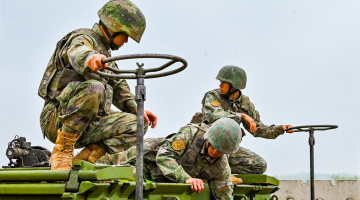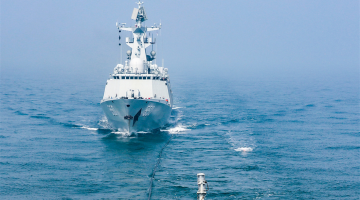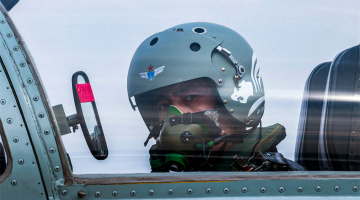
By Wang Zhen
On November 10, Bolivian President Evo Morales suddenly announced his resignation. Immediately afterwards, Vice-President Alvaro García and Senate President Adriana Salvatierra also resigned, while president of Bolivia's Supreme Electoral Tribunal (TSE) María Eugenia Choque was arrested. Bolivia is currently leaderless across the country. Anyone who can take over the presidency according to the Constitution has resigned, not willing to take over the "awful mess". What in the world has happened to Bolivia?
The direct fuse of the chaos in Bolivia was the presidential election held on October 20. The opposition, led by former Bolivian President Carlos Mesa, questioned the vote result and accused then President Evo Morales of "fraud". Subsequently, the opposition launched a national protest with the support of the Organization of American States (OAS), followed by serious violent actions occurring in the capital and major cities, leading to heavy losses. Evo Morales promised to recount the votes, and even claimed to open re-election along with a series of countermeasures taken. However, his measures are not successful, and the situation in Bolivia has gone out of control.
According to reports, then Bolivia's military commander called on Morales to resign, as entrusted by the Bolivian military to pressure Morales to "abandon power" to "save the country", and alleviate the serious violence caused by the presidential election. Morales had to surrender in the hopeless situation. This has reminded me of the scene of Venezuela in 2002, which was strikingly similar to the present state in Bolivia. At that time, after a long period of violent turmoil, Venezuelan senior military officers defected, commanders of the Venezuelan military including air force, army, and navy together headed to the presidential palace to "exhort the president to quit", but the then President Hugo Chávez would rather die than resign, and was forcibly ousted to a small island in the Caribbean for 47 hours of custody and then returned to the presidential palace. Latin American countries have a tradition of military interference into political affairs, which often occurs after the unrest. However, there has always been much support and manipulation from the US behind the military interference into politics. This can be seen in the Pinochet Case in the 1970s, and the Venezuelan coup at the beginning of the 21st century, as well as many similar operations happened in between, which are all related to the US.
It can be said that the external forces' intervention, especially the direct violent interference from the US, is an important reason for the sudden changes in the Bolivian political situation. Morales, known as the "anti-American fighter", is the Latin American left-wing leader equally famous as former President Chavez of Venezuela. After the death of Chavez, Morales is regarded as the representative of "radical left", thus becoming an obstacle for the US to return to the "Monroe Doctrine ".The US is surely to eradicate him. Both Maduro and Morales are listed at the top in the "blacklist" of US President Donald Trump, Secretary of State Mike Pompeo and others. The US seems to have premeditated for a long time to bring Morales down through this election.
As the result of the general election, the re-election of Morales, was announced in the Supreme Electoral Tribunal of Bolivia, the US and the OAS immediately alleged that the counting of votes was "fraudulent", and the statistics was illegal. Recounting and then re-election were required by them in succession. After Morales’ resignation, the police immediately arrested the head of the Supreme Electoral Tribunal of Bolivia, on charges of falsifying the counting result and getting involved in the election fraud, according to the OAS allegation.
History and reality have repeatedly proved that US-led interference is the source of power for the emergence, escalation and even irremediable situation of most of the unrest in Latin American countries. Other Latin American countries that are suffering turmoil are also difficult to get rid of its control, just like the present Bolivia. Comparing the US attitudes towards the situationsboth in Bolivia, Ecuador and Chile, we can clearly detect its "double standards", that is, when the "left-wing" regime gains momentum, the US will fish in troubled waters; while if the "right-wing" regime is in turmoil in power, the US will keep silent.
Sure enough, in addition to external intervention, the unrest is also an outbreak of political, economic, social and ethnic conflicts accumulated in Bolivia. The "left-wing" and "right-wing" disputes are only a political manifestation, but the fundamental point is how to improve the development and governance of the country under the current national conditions in Bolivia, and how to deal with the innate maladies of Bolivia, including the unfair distribution in society, and how to improve the situation of the poor while taking into account other social classes, especially the interests of the weak middle class. These are problems yet to be solved even after multiple years’ exploration. Morales has been re-elected three times, and his economic policies had both advantages and disadvantages. In recent years, the economic situation in Bolivia is in steady progress in South America, but its social problems remain to be its shortcomings, which are prone to be manipulated by the opposition.
The resignation of Morales has rendered Bolivia a temporary “anarchy” state, but this is by no means the final outcome, and may be the beginning of new unrest. The "pro-Morales party", dominated by the poor and indigenous groups, is destined to fight back, and Morales himself will not retire from the stage. The situation in Bolivia will remain unstable in the short term, which willmingle with other Latin American countries in chaos, making the political situation in chaos in Latin American even more complicated and confusing.
(The author is a senior researcher at the China Foundation for International Studies (CFIS) and former Chinese Ambassador to Venezuela)
Disclaimer: This article is originally published on huanqiu.com, and is translated from Chinese into English and edited by the China Military Online. The information, ideas or opinions appearing in this article do not necessarily reflect the views of eng.chinamil.com.cn.









